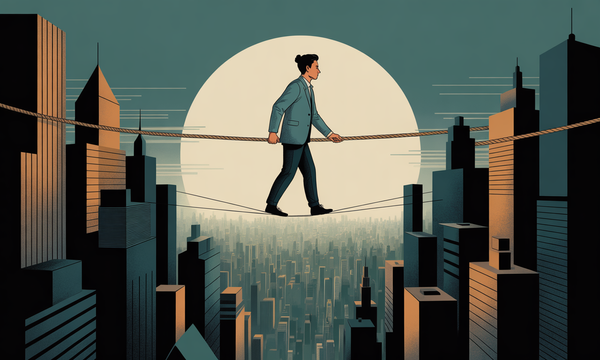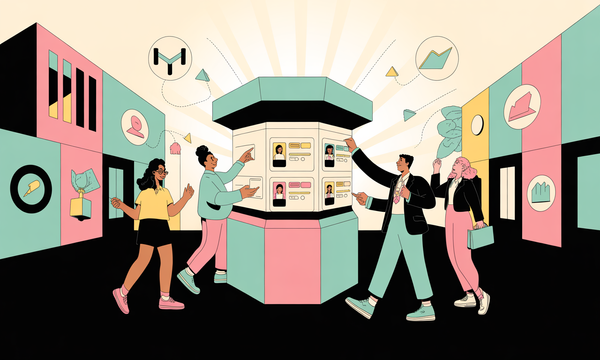9 must-knows before hiring a creative agency for your consumer brand

As a consumer business owner in the early stages of growth, you know just how crucial it is to acquire new customers and keep them engaged with targeted marketing campaigns. But to make those campaigns a success, you need a team of creative experts who can help you build your brand image.
There are two ways to approach this: you can either assemble an in-house team of marketers, designers, and copywriters, or you can collaborate with a creative agency that can provide the technical expertise and creative talent you need.
But here is the catch: in the fast-paced marketing world, the task of selecting the right creative agency is humungous and can be the key to unlocking your brand's full potential.
With numerous agencies vying for attention, focusing on a few essential factors is crucial to ensure a successful partnership. Therefore, we spoke with Kasturi Banerjee, the founder of India’s first homegrown premium rum, Maka Zai, Rohan Rehani, founder of Moonshine Meadery, alcoholic beverages made from honey and Nikunj Agarwal, the co-founder of The Invisible Paintbrush, a Bangalore-based creative agency, to bring to you the 9 points you must consider before hiring a creative agency.
1. Deciding the right time to look out for a creative agency
Kasturi Bannerjee, the founder of Maka Zai rum, believes that when you are ready with creative marketing ideas and need a partner who can transform your ideas into tangible designs, the need for a creative agency arises.
With social media and PR being such an integral part of brand building, you have to keep investing in new campaigns (social media or print media) or design communications for an event; it all depends on the expertise that creative agencies bring in with them.
Rohan Rehani, who co-founded Moonshine Meadery, believes in getting on board a creative agency that can work in conjunction with your in-house team to brainstorm a marketing strategy that aligns with your idea of how you want to market your brand.
On the other hand, Nikunj Agarwal, founder of The Invisible Paintbrush, feels that the most important thing for brands looking out for a partnership with creative agencies is having a clear sense of the goals they want to achieve. Many brands make the mistake of treating business and marketing goals as the same thing.
2. Identifying the best potential agencies for your brand goals
Narrowing down the options of potential agencies can be daunting when there are so many.
- Start by defining your specific business goals and needs, as this will help you identify agencies that offer the services you are looking for and align with your objectives.
Rohan advises you to have a sense of clarity about what your brand stands for and how you want your prospective customers to perceive your brand. Once you have this clarity, it becomes easy to communicate your objectives better.
- Once you have a list of potential candidates, take the time to research each agency thoroughly. Look for examples of projects similar to your needs, assess the quality of their work, and review case studies or testimonials that demonstrate their ability to achieve results and approach collaboration.
Kasturi’s style leverages word-of-mouth communication to spread the word and gain references from friends and other professionals.
- When researching potential agencies, practical factors include size, location, and pricing. Be mindful of the logistics of working with an agency in a different location or time zone, and ensure their pricing structure aligns with your budget.
Nikunj shares that he decides based on how much it costs him to produce say, a design, a campaign or a tagline song, whatever it may be. And that cost is measured as my talent cost and how much time we will dedicate to it.
Once you have narrowed your options, it’s time to go deep, understand more about their expertise, and evaluate their creative process.
3. Evaluating the creative process and technical expertise
It’s helpful to set up a communication round once to know more about them.
To gauge the technical expertise of a creative agency, delve deep into their most successful campaigns.
- Ask probing questions about the marketing objectives, communication strategies, and consumer insights that drove their campaigns.
- Understanding how the agency translates marketing goals into actionable communication objectives can provide valuable insights.
Kasturi shares that she first initiates a conversation to explore if there is a mutual fit. She then reviews their work, particularly in the alco-bev industry. She also likes to engage in detailed conversations to understand the agency’s unique points of view about the industry.
4. Ensuring consistency and category understanding
Consistency in brand messaging is often a pivotal parameter for marketers. Evaluate the agency's track record in maintaining brand consistency across its most successful brands.
Examine whether their approach aligns with your belief in the importance of a consistent brand image. Additionally, discuss their thoughts on the category and how they conceptualise campaigns within it. A misalignment in thought processes can hinder the agency's commitment to the type of work your brand demands.
Through detailed conversations, Kasturi can understand a creative partner’s perspective and experiences within the alco-bev industry. She firmly believes a strong understanding of the sector’s nuances is vital.
5. Building a committed and qualified team
The individuals who pitch for your business may be someone other than the ones actively working on your brand.
- Always request to meet and interact with the team handling your account. Treat them as extended team members, evaluating their qualifications and interest in your brand.
- Checking for a cultural fit is crucial; consider it akin to hiring employees for your organisation.
- Ensuring the key people working on your brand are qualified and genuinely interested can significantly impact the outcome of the collaboration.
6. Taking a closer look at failure and divergent perspectives
Ask about the agency's biggest campaigns that failed. Understanding their failures can provide insights into their ability to learn and adapt.
Additionally, inquire about successful ad campaigns they dislike but acknowledge as effective. This reveals their capacity to appreciate diverse approaches, even if they differ from their own.
7. Embracing diversity for a broader perspective
Look for agencies with clients from varied industries, including one of your interests. The ability to bring cross-industry learning to the table can be a game-changer. A diverse portfolio showcases adaptability and a broader perspective that can benefit your brand.
Kasturi enjoys working with different agencies because of the freshness, new ideas, and unique perspectives they bring to the table.
8. Testing the waters for a sustained partnership
Consider putting the selected agency on a trial run for 90-120 days. This allows you to evaluate how well they understand your offerings and how quickly they adapt. Ensure that key individuals work on your account during this trial period to gauge the agency's commitment.
9. Understanding the role of agencies; collaboration, not replacement
Recognise that brands are the driving force, not the agencies. Remember, agencies are extensions of your marketing efforts, not replacements for your internal teams.
They act as hands and limbs in execution but should not be expected to function as the brain.
Instead of expecting agencies to be the brains, brands should lead in providing direction and technical expertise.
The collaboration between brands and agencies should be symbiotic, with both contributing their unique strengths.
Nikunj shares that many brands falter and end up with bad output because they don't clearly define what they seek. Rather than saying they want a viral campaign, which is what many brands end up saying, he thinks it's a better way for them to think about what it is in their brand that has the opportunity to go viral. And so, how can they creatively leverage that?
The practical evaluation of agencies lies in their ability to bring diverse industry experiences and creative flair.
In conclusion, the emphasis on technical expertise, alignment in thought process, and involvement of the right people reflects a strategic and holistic approach to selecting the ideal agency partner. By focusing on these key aspects, brands can establish a symbiotic relationship with agencies, fostering creativity, innovation, and a stronger brand presence in the market.




